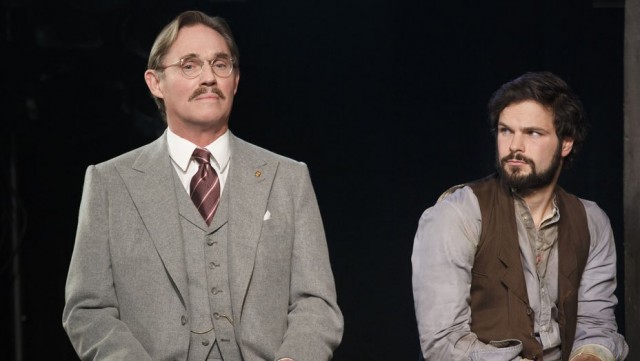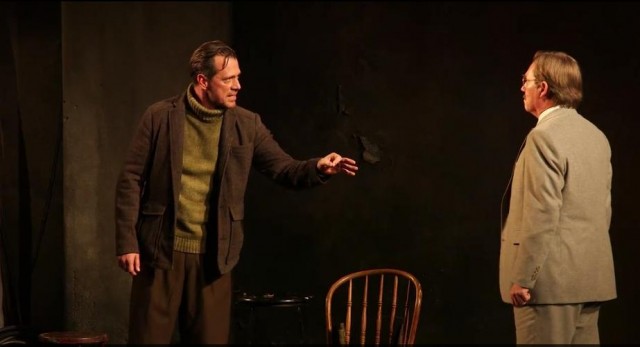
Von Berg (Richard Thomas) and Lebeau (Jonny Orisini) discuss their fate in Signature revival of rarely performed Arthur Miller play (photo by Joan Marcus)
The Pershing Square Signature Center
The Irene Diamond Stage
480 West 42nd St. between Tenth & Eleventh Aves.
Tuesday-Sunday through December 20, $55-$85
212-244-7529
www.signaturetheatre.org
Arthur Miller’s 1964 play, Incident at Vichy, currently being staged in a stark, powerful production at the Signature Theatre, isn’t set in the Twilight Zone, but it shares that series’ atmosphere of postwar anxiety. In the classic 1961 Twilight Zone episode Five Characters in Search of an Exit, an existential drama that combines Luigi Pirandello with Jean-Paul Sartre, series creator and host Rod Serling announces in the beginning, “Five improbable entities stuck together into a pit of darkness. No logic, no reason, no explanation; just a prolonged nightmare in which fear, loneliness, and the unexplainable walk hand in hand through the shadows. In a moment, we’ll start collecting clues as to the whys, the whats, and the wheres. We will not end the nightmare; we’ll only explain it.” Adding a bit of Beckett and Kafka to that mix, Miller tells the story of nine men and one teenager who have been escorted off the streets of 1942 Paris and left to wait in a dank, dilapidated detention room (the set is by Jeff Cowie), where they contemplate who they are, why they have been brought there, and how — and if — they will get out. In the room are Lebeau (Jonny Orsini), an antsy, nervous artist who desperately wants to know what is going on; Bayard (Alex Morf), a Communist electrician who has heard frightening rumors; Marchand (John Procaccino), a businessman who wants this all over so he can attend an important meeting; a quiet, nervous teenage boy (Jonathan Gordon); Monceau (Derek Smith), an actor who refuses to believe that anything bad is going to happen to them; a waiter (David Abeles) who has served the Major (James Carpinello) in his restaurant and assures everyone that the German officer is a decent guy; a Gypsy (Evan Zes) laying on the floor and clutching a pot; an old Jewish man (Jonathan Hadary) holding tight to his ragged bundle; Leduc (Darren Pettie), a brave, bold psychoanalyst and army veteran who has faced the Major on the field of battle; and Von Berg (Richard Thomas), an effeminate prince from an Austrian royal family.
Why they have all been abducted remains a mystery for quite some time, as the nine men and the boy appear to have little in common, from age, status, and looks to wealth, education, and rank and, most important, religion. It takes until twenty minutes into the play for Von Berg to ask the question that has been on everyone’s mind, including the audience’s: “Have you all been arrested for being Jewish?” It’s a tribute to the skill of the writing and the strength of Michael Wilson’s direction that this line is so strong without being overly obvious; it also helps make the play that much more relevant in the twenty-first century. “You don’t get any . . . special flavor, huh?” Lebeau asks Marchand, who replies, “What flavor?” Lebeau says, “Well, like . . . some racial . . . implication?” To which Marchand states definitively, “I don’t see anything to fear if your papers are all right.” Incident at Vichy might ultimately be about Jews in occupied Paris, but it just as easily could have been about the communist witch hunt led by Sen. Joseph McCarthy in the 1950s; the exploits of the House Un-American Activities Committee, which resulted in the blacklisting of many Hollywood writers (Miller himself was called to testify in front of the commission in 1956 but refused to name names; perhaps not coincidentally, most of the character names are not used in the show itself but identified only in the program); as well as the current debate over how to treat Muslim immigrants and Syrian refugees.

Leduc (Darren Pettie) and Von Berg (Richard Thomas) are at odds in INCIDENT AT VICHY (photo by Joan Marcus)
The second half of the intermissionless ninety-minute play does indeed get more didactic as the characters debate their fate, particularly Leduc and Von Berg, but the bulk of the play still holds up extremely well. The acting is exceptional throughout, with stand-out performances by Thomas (Race, The Waltons) as the gentle Von Berg, who finds Nazism to be “an outburst of vulgarity”; Morf (Of Mice and Men, War Horse) as the very serious Bayard; Carpinello (Rock of Ages, Xanadu) as the possibly conflicted Major; the always engaging Procaccino (Love and Information, Nikolai and the Others) as the self-centered, well-attired businessman; and Pettie (Strange Interlude; Detroit, This) as the heroic Leduc. Leduc delivers one of the most critical lines, explaining, “Jews are not a race, you know. They can look like anybody,” making us all potential victims of Fascism. AJ Cedeño is the police captain, while Brian Cross is Professor Hoffman, the mastermind behind the operation. The tale also serves as a microcosm of the Jewish response as Nazism took hold in Germany and spread through Eastern Europe. Wilson (The Old Friends, The Trip to Bountiful) guides it all with a firm yet respectful hand, adding occasional strobe flashes that signal it’s time for the next person to meet his fate. Miller, who died in 2005 at the age of eighty-nine, had considered reviving Incident at Vichy during his 1997–98 residency at the Signature, which has finally brought it back for the ongoing celebration of the centennial of Miller’s birth, with A View from the Bridge now on Broadway and The Crucible to follow in the spring. The play debuted on Broadway in 1964, was first performed in London in 1966 with Alec Guinness, Anthony Quayle, and Nigel Davenport, and was made into a 1973 TV movie directed by Stacy Keach. The play, which was never considered one of Miller’s best, was revived in 2009 by the Actors Company Theatre, but otherwise it has not been seen in New York City for fifty years, making the Signature revival not only a welcome revisiting of the work but a timely, relevant one as well. “Where are we? What are we? Who are we?” the Major asks in Five Characters in Search of an Exit. “None of us knows, Major,” the Ballerina answers. “We don’t know who we are. We don’t know where we are. Each of us woke up one moment and here we were in the darkness.” These are questions and answers that are in serious need of discussion in order to try to shed light on what is going on in today’s world.